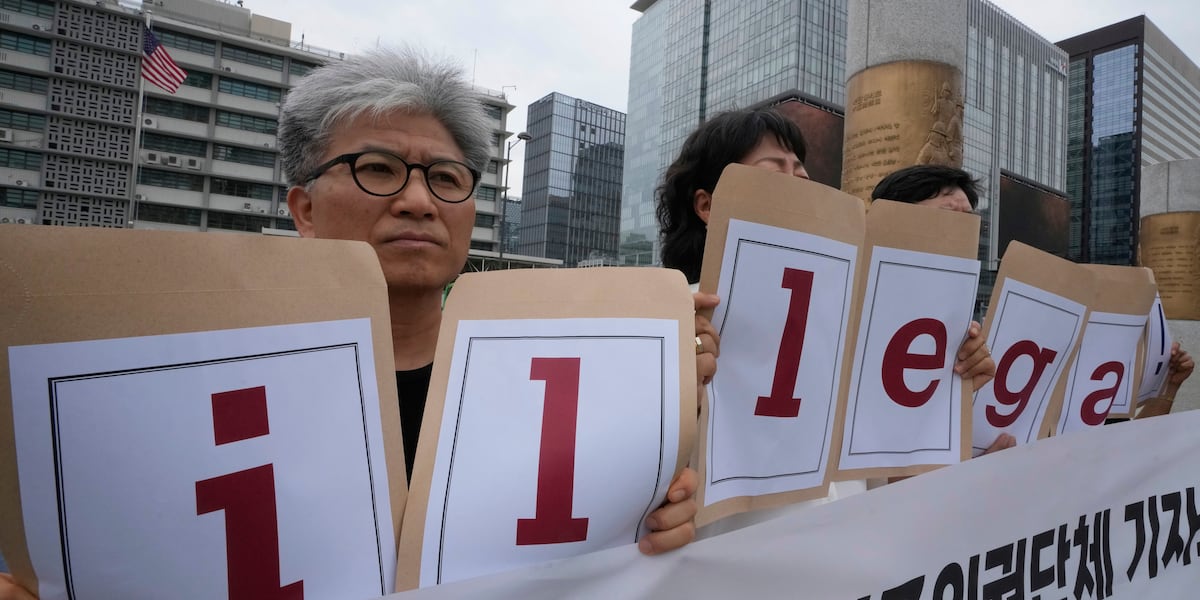Why Did South Korea Send a Plane to Rescue Workers Detained in a US Immigration Raid?

Published: 2025-09-10 02:56:17 | Category: policy GNEWS Search
On 4 September, a significant immigration raid in Georgia resulted in the detention of 475 workers, including over 300 South Koreans, sparking outrage and diplomatic concern between South Korea and the United States. In response, the South Korean government has arranged a charter flight to repatriate the detained workers, highlighting the complexities of international labour and immigration policies.
Last updated: 13 October 2023 (BST)
Key Takeaways
- A total of 475 workers were detained in an immigration raid at a battery factory in Georgia.
- More than 300 of the detainees are South Korean nationals.
- The South Korean government arranged a charter plane to bring back the workers.
- The incident has raised concerns over the impact on South Korea-U.S. relations.
- Experts suggest the South Korean government is unlikely to take retaliatory measures despite public outrage.
The Background of the Immigration Raid
The immigration raid, conducted by the U.S. Department of Homeland Security, was reported as one of the largest of its kind. It targeted a battery factory under construction at Hyundai’s auto plant near Savannah, Georgia. This facility is pivotal for South Korea's investment in the U.S., particularly in the electric vehicle sector.
Details of the Raid
During the raid, authorities detained a total of 475 workers, many of whom were reportedly shackled during their arrest, which elicited shock and dismay across South Korea. Video footage of the event showed them restrained with chains around their wrists, ankles, and waists, a scene that has been described as distressing and disgraceful by many South Koreans.
International Reactions and Diplomatic Implications
The response from the South Korean government was swift. They reached an agreement with U.S. authorities to facilitate the release of the detained workers. The South Korean Foreign Ministry indicated that a charter flight was arranged to bring the workers back home. This incident has cast a shadow over the deep-rooted military and economic ties between South Korea and the U.S., particularly given the significant investments South Korea has promised in the U.S. economy.
Understanding the Context of U.S.-South Korea Relations
The U.S. and South Korea have maintained a strong alliance since the Korean War, with the U.S. deploying approximately 28,500 troops in South Korea. This military presence plays a crucial role in the region's stability and security. However, incidents like the recent immigration raid can strain these relations, especially when public sentiment in South Korea is affected.
Historical Context of the Alliance
The alliance has experienced fluctuations over the decades, but surveys consistently show that a majority of South Koreans support the partnership. The recent raid, however, has sparked discussions about the potential for future diplomatic strains, particularly if similar incidents occur.
Public Sentiment in South Korea
In South Korea, the raid is perceived as a national disgrace. Many citizens express feelings of betrayal by a nation they consider a key ally. The South Korean government, under President Lee Jae Myung, has acknowledged its responsibility in the matter and is seeking to prevent a recurrence of such incidents. President Lee emphasised the need for improved systems to ensure that South Korean businesses can operate without fear of unfair treatment in the U.S.
The Business Impact of the Raid
The Georgia raid has significant implications for South Korean businesses operating in the U.S. The battery factory is particularly important as it aligns with the global shift towards electric vehicles. However, according to immigration attorney Charles Kuck, the skilled labour required for the factory’s operations is not readily available in the U.S., necessitating the need for foreign experts.
Training and Skilled Labour Needs
Kuck highlighted that the machinery and technology used in the Georgia plant are not manufactured in the U.S., which means foreign workers with specialised skills must carry out installations and repairs. This situation raises questions about the future of U.S. immigration policy and its impact on the availability of skilled labour for high-tech industries.
Future Considerations for South Korea and the U.S.
Looking ahead, the South Korean government is likely to maintain diplomatic dialogue with the U.S. to ensure that such incidents do not repeat. They will be advocating for a more nuanced approach to immigration enforcement, particularly concerning skilled workers who are essential for the country's economic interests.
Potential for Diplomatic Setbacks
While experts suggest that the South Korean government may not take retaliatory actions due to the strong military and economic ties with the U.S., the potential for diplomatic setbacks remains. The South Korean public's reaction to the raid could influence future negotiations and agreements between the two nations.
Conclusion
The recent immigration raid in Georgia serves as a reminder of the complexities involved in international labour and immigration policies. As South Korea navigates its diplomatic relationship with the U.S., the focus will likely remain on safeguarding the rights of its workers abroad while fostering continued economic investment. The situation calls for careful monitoring and proactive measures to ensure that both nations can work collaboratively without compromising on essential values.
How will this incident shape the future of South Korea-U.S. relations, particularly in the context of economic cooperation? #USKoreaRelations #ImmigrationPolicy #SkilledLabour
FAQs
What happened during the immigration raid in Georgia?
A significant immigration raid in Georgia resulted in the detention of 475 workers, over 300 of whom were South Koreans. The raid targeted a battery factory under construction and raised serious diplomatic concerns.
Why were South Korean workers detained in the U.S.?
The South Korean workers were detained for allegedly being in the U.S. illegally while working at a battery factory. The raid was part of a larger immigration enforcement initiative by U.S. authorities.
How is the South Korean government responding to the raid?
The South Korean government has arranged a charter flight to repatriate the detained workers and is working with U.S. authorities to prevent similar incidents in the future.
What are the implications for U.S.-South Korea relations?
This incident has the potential to strain U.S.-South Korea relations, especially if public sentiment in South Korea continues to view the U.S. actions unfavourably. Diplomatic dialogue will be crucial in maintaining the alliance.
Could this incident affect future investments by South Korea in the U.S.?
Yes, the raid could impact South Korean companies' willingness to invest in the U.S. if they perceive a risk to their workers or operations. Ongoing diplomatic discussions will be essential.



